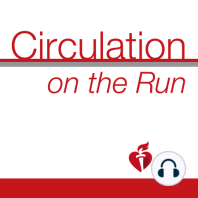17 min listen
Circulation December 18, 2018 Issue
ratings:
Length:
23 minutes
Released:
Dec 17, 2018
Format:
Podcast episode
Description
Dr Carolyn Lam: Welcome to Circulation on the Run, your weekly podcast summary and backstage pass to the journal and its editors. I'm Dr Carolyn Lam, associate editor from the National Heart Center and Duke National University of Singapore. In today's feature discussion, we will be doing a deep dive into the LEADER trial results, looking at new results of liraglutide and its effects in patients with type two diabetes, with or without a history of myocardial infarction or stroke. All of that coming right up after these summaries. In today's issue, five groups of investigators in two original basic research articles and three research letters tackled the same biological question, and all reached the same conclusion that cells in the heart expressing the SCA-1 cell surface antigen do not become cardiomyocytes to any meaningful degree, and instead become endothelial cells. Among the original basic papers, first author Dr Vagnozzi, corresponding author Dr Molkentin from Howard Hughes Medical Institute and Cincinnati Children's Hospital Medical Center, and their colleagues use the inducible recombinase method and generated a constitutive recombinase at the SCA-1 locus. They found that cardiac resident SCA-1 positive cells were not significant contributors to cardiomyocyte renewal in vivo. Instead, SCA-1 positive cells generated cardiac vasculature throughout development, during aging, and following injury with trivial contribution to the cardiomyocyte population. In the second paper from co-first authors, Drs Zhang and Sultana, with corresponding author Dr Cai from Indiana University School of Medicine and colleagues, these authors engineered a series of genetically altered mice to identify and track SCA-1 positive cells in the heart, and found that SCA-1 positive cells were purely of the endothelial lineage. Together with three research letters, these five papers add to the growing body of evidence that in adult mammals, our new cardiomyocytes arise from preexisting cardiomyocytes and rarely, if at all, from adult cardiac stem cells. Could metformin be cardioprotective in patients with type one diabetes? Co-first authors Drs Bjornstad and Schafer, corresponding author Dr Nadeau from University of Colorado School of Medicine, and their colleagues hypothesized that adolescents with type one diabetes have impaired vascular function, and that metformin may improve insulin resistance and vascular dysfunction. To test this hypothesis, they studied 48 adolescents with type one diabetes and 24 non-diabetic controls using MRI of the ascending and descending aorta, as well as assessment of carotid intima-medial thickness by ultrasound, brachial distance ability by DynaPulse, fat and lean mass by DXA, fasting labs following overnight glycemic control, and insulin sensitivity by hyperinsulinemic euglycemic clamp. The adolescents with type one diabetes were randomized one as to one to three months of 2000 milligrams metformin or placebo daily, after which the baseline measures were repeated. The authors detected early signs of cardiovascular disease with MRI in these adolescents with type one diabetes compared to controls. They further found that three months of metformin therapy improved insulin sensitivity as assessed by gold standard hyperinsulinemic euglycemic clamp, both in normal weight and obese adolescents with type one diabetes. Moreover, metformin improved carotid intima-medial thickness and aortic wall shear stress and stiffness. Thus, metformin may hold promise as a cardioprotective intervention in type one diabetes. What are the clinical genetic and environmental determinants of v
Released:
Dec 17, 2018
Format:
Podcast episode
Titles in the series (100)
Circulation January 24, 2017 Issue: Circulation Weekly: Your Weekly Summary & Backstage Pass To The Journal by Circulation on the Run
